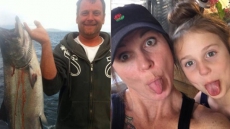PRINCE RUPERT, B.C. — Hammy the deer is no longer wearing the latest in antler adornments after conservation officers in Prince Rupert, B.C., caught up with the animal on Thursday.
The adult buck earned his name after he was cut free from a backyard hammock in August, but a tangle of purple fabric was left behind.
He gained a following after being spotted numerous times in the northwestern B.C. town with part of the purple hammock wrapped around his antler.
The wad of string gave the buck a dash of elegance and resembled a woman's cocktail hat, but Zane Testawich with the B.C. Conservation Officer Service says they were concerned it could be dangerous if the deer butted heads with other males during mating season.
Officers tried to track Hammy to perform the rescue last week without success, but were able to tranquilize the animal on Thursday and use a knife to cut the string free.
Testawich says the officers also painted one of the deer's antlers purple to help keep track of him for the rest of the season.
He says the service usually likes to watch animals that it injects with drugs using a large yellow ear tag so that people can report on the its well-being, Testawich says.
"We kind of thought in this instance, (painting an antler purple) would allow us to keep track of Hammy and let the people still have a connection to that animal," he says.
Repeated Hammy sightings in the community prompted a dedicated Facebook page that has gained him international attention.
Testawich says after freeing the buck, conservation officers watched him eat, drink and visit with other deer before the officers left the area.





